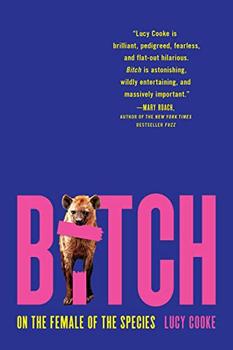Summary | Excerpt | Reviews | Beyond the Book | Readalikes | Genres & Themes | Author Bio

On the Female of the Species
by Lucy CookeAUTHOR'S NOTE ON LANGUAGE
Language evolves rapidly, and there is currently much conversation about the conflation of sex and gender terms. It is critical to use these terms appropriately and not to confuse them. Most scientists agree that non-human animals do not have gender. In this book, the terms female and male refer to an animal's biological sex. I do engage in anthropomorphizing, to an extent. Sometimes this is because these were the historical terms used. For example, I may refer to an animal's genitalia as being 'masculinized' or a brain being 'feminized' as this was the original scientific description. Such gendered terms needn't and shouldn't be used to describe animals' sex characteristics and behaviours in scholarly realms today. I also use gendered terms such as 'mother' and 'father' to describe animals, because these are the terms used by the scientists in question and most of my audience will understand what or who I refer to with these terms – for instance, 'mother' may mean the egg-producing parent of an individual animal. At other times, I have used anthropomorphic terms such as femme fatale, queen, lesbian, sister, lady and bitch for storytelling purposes, and readers needn't choose to replicate these labels in their academic work. I recognize that this anthropomorphizing can, unintentionally, have gendered implications. This book intends to demonstrate that sex is wildly variable and that gendered ideas based on assumptions of binary sex are nonsense. It is my sincerest hope that this intent has been clearly communicated.
CHAPTER ONE
The anarchy of sex: what is a female?
Let's start by heading underground to meet a highly secretive female: enemy number one of the landscape gardener and greedy consumer of worms.I'm talking about the mole, Talpa europaea.
Most of you will be familiar with the mole's handiwork, if not the beast itself. Their conical piles of freshly turned dirt can disrupt a smoothly manicured lawn like a chronic case of acne – the ultimate pain in the grass.
Back in the 1970s my father would be driven to distraction by molehills invading his precious turf. Much to my dismay, he'd set barbaric-looking metal traps to catch their creators. Once a mole was ensnared, I would insist he hand their lifeless bodies over to me so I could stroke their oh-so-velvety silver-black fur and marvel at their strangeness – their minute beady eyes (which despite popular mythology are poorly sighted but not totally blind) and comically oversized pink front paws – before giving them a proper burial. Back into the earth, where they belong.
The female mole is indeed a wondrous creature. A solo operator who makes her living by hunting worms using a network of tunnels that act as her own form of animal trap. When a worm pushes through her subway ceiling, she quickly sniffs it out using a long pink snout that can actually smell in stereo – each nostril acts independently, allowing her brain to accurately compute the direction of dinner in the pitch black. Her quarry, once caught, isn't killed immediately; instead, the mole paralyses it with her venomous saliva so it can be stored alive in a specially constructed larder without turning to rot. As many as four hundred and seventy wrigglers have been recorded in one lucky mole's pantry, which is helpful as she needs to consume over half her body weight in worms a day.
Life underground is tough. Burrowing earth is exhausting work and there's comparatively little oxygen to breathe. To survive this hostile environment evolution has equipped the mole with some cunning specializations. Her blood sports a modified form of haemoglobin that increases her affinity for oxygen and tolerance of toxic waste gases. And she sports an extra 'thumb'. Just like in the panda, a bone from her wrist has shot off on its own evolutionary path and formed a useful new digit for shifting extra earth. But perhaps most impressive of all are the female mole's balls.
Excerpted from Bitch by Lucy Cooke. Copyright © 2022 by Lucy Cooke. Excerpted by permission of Basic Books. All rights reserved. No part of this excerpt may be reproduced or reprinted without permission in writing from the publisher.
Your guide toexceptional books
BookBrowse seeks out and recommends the best in contemporary fiction and nonfiction—books that not only engage and entertain but also deepen our understanding of ourselves and the world around us.